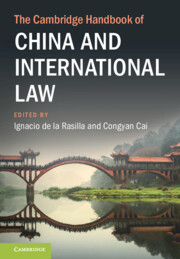Book contents
- The Cambridge Handbook of China and International Law
- The Cambridge Handbook of China and International Law
- Copyright page
- Contents
- Figures
- Contributors
- Foreword
- Acknowledgements
- Abbreviations
- Introduction
- Part I Taking Centre Stage in Global Governance and the International Legal Order
- Part II Interfaces between National and International Law
- Part III Selected Areas of Chinese State Practice
- Part IV International Peace and Security
- Part V Human-Centred International Law
- Part VI The Habitat and the Global Commons
- 16 China and International Environmental Law
- 17 China and Global Climate Change Governance
- 18 China and the Law of the Sea
- 19 China and the Non-weaponization of Outer Space
- Part VII International Economic Law
- Part VIII International Dispute Settlement
- Index
19 - China and the Non-weaponization of Outer Space
Towards a Relational Normativity
from Part VI - The Habitat and the Global Commons
Published online by Cambridge University Press: 04 January 2024
- The Cambridge Handbook of China and International Law
- The Cambridge Handbook of China and International Law
- Copyright page
- Contents
- Figures
- Contributors
- Foreword
- Acknowledgements
- Abbreviations
- Introduction
- Part I Taking Centre Stage in Global Governance and the International Legal Order
- Part II Interfaces between National and International Law
- Part III Selected Areas of Chinese State Practice
- Part IV International Peace and Security
- Part V Human-Centred International Law
- Part VI The Habitat and the Global Commons
- 16 China and International Environmental Law
- 17 China and Global Climate Change Governance
- 18 China and the Law of the Sea
- 19 China and the Non-weaponization of Outer Space
- Part VII International Economic Law
- Part VIII International Dispute Settlement
- Index
Summary
This chapter examines China’s differential approach vis-à-vis developing and developed countries in advancing its normative agenda on non-weaponization in outer space before the Conference on Disarmament and the UN General Assembly. Pursuant to the logic of the democratization of international relations, China has gained the majority support of developing countries for its agenda around their commonly shared values of peace and development and through other forms of functional cooperation in their outer space activities – increasing its international legitimacy in their eyes. Conversely, China has yet to gain the trust of technologically advanced – developed – nations in order to give its future regulatory framework governing peaceful relationships in outer space its much-needed normativity. Instead, past disarmament efforts in outer space during the Cold War can guide China’s norm-entrepreneurship where it must seek consensus among the major space powers, the United States in particular, on the basis of trust. Without such a fertile soil, however, any rules on the prevention of an arms race in outer space cannot take root.
Keywords
- Type
- Chapter
- Information
- The Cambridge Handbook of China and International Law , pp. 379 - 394Publisher: Cambridge University PressPrint publication year: 2024

